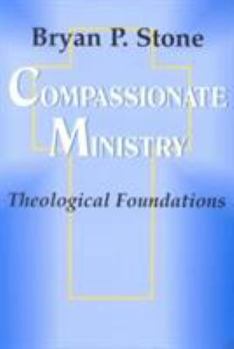Compassionate Ministry
Select Format
Select Condition 
Book Overview
It offers a solid introduction to the theology of ministry through an approach rooted in the compassion of God, which Stone shows is evident throughout the scriptures and made real in the incaration... This description may be from another edition of this product.
Format:Paperback
Language:English
ISBN:1570750696
ISBN13:9781570750694
Release Date:May 1996
Publisher:Orbis Books
Length:168 Pages
Weight:0.70 lbs.
Dimensions:0.5" x 6.0" x 9.4"
Customer Reviews
3 ratings
Biblical Foundations and a Liberation Perspective
Published by Thriftbooks.com User , 23 years ago
This book is born out of Dr. Stone's work with a church community he helped to found in Texas. It shares with the reader some of the insights he gleaned, presented in such a way as to make them applicable to others hoping to do relevant ministry with the poor.Stone does not pull any punches in his book. He questions whether it is possible to truly claim to be Christian when one does not enter into the suffering of the people. In short, he concludes that one cannot. Thus, the task of the church is to be one with those who suffer, one with those who are oppressed, and one with those who are disempowered. The purpose of this enterprise is to empower the poor, to make those who are told that they have no means by which to affect change realize that God struggles with them - that God's church struggles with them.Stone's own Process and Liberation theological background shows through in this work, and some will find the book more, or less, appealing because of this. Nevertheless, however one may hold these influences, the book is particularly interesting because of the degree to which he ground his approach in his own Wesleyan Biblical tradition. He creates a bridge between these various schools of thought and offers a challenge to all concerned.Some will take offence at Stone's strong assertions. But it is high time that we have books written from a more radical perspective that reclaim Scripture and authoritative teaching. The watered down hedgings of others are put to shame by Stone's fidelity to the Biblically grounded approach of his Wesleyan heritage.
A Challenge to the Church
Published by Thriftbooks.com User , 24 years ago
North American liberation theologian Bryan P. Stone provides an important contribution to an understanding of Christian ministry in his book COMPASSIONATE MINISTRY (1996). Stone argues for a reflexive understanding of the relationship between theory (theology) and practice (ministry). Through the exercise of creative imagination, Christians move from theological conviction to action in the world. Through the practice of spirituality (which aims for living the whole of life in response to God), Christians find resources for critically reflecting on their theology and ministries, thereby enriching the church's theological self-understanding as a community called to serve the needs of a suffering world. Fundamental to Stone's argument is the conviction that "what we do shapes and determines what we think," and that "what we think and believe shapes and determines what we do" (p. 52). Theory and praxis are thus flip sides of the same coin of Christian ministry.By elucidating the process of how theology informs ministry and how ministry may shape theology, Stone's commitment to standpoint epistemology surfaces. "Where we stand," he writes, "makes a difference in what see," "in the way we think," and "in what we hope for" (p. 5). Social location shapes perceptions and theological interpretations of reality. Given this epistemological perspective, Stone voices a concern. If experience shaped by social location becomes the sole determinative factor in shaping theology and practices of ministry, then Christian theology collapses into a "a mere rationalization of what we already do and where we already stand" (p. 5).Stone's proposal for overcoming this problem is perhaps the most challenging aspect of the book. This is the invitation to make a concrete commitment to the poor, the suffering, the marginalized, the victimized, and the oppressed. Making this move entails two consequences. In the first place, it means taking the "view from below" by listening to the poor and the powerless and by shaping the practices of ministry in solidarity with their needs (p. 13). Related to this is a second consequence: a preferential option for the poor and the marginalized in Christian ministry. It is the responsibility of Christians, Stone argues, "to adjust our wants in accordance with their needs, and to work together to place the full resources of the church and society at the disposal of relief, empowerment, justice, and community" (p. 16).Stone provides theological warrants for this fundamentally liberationist conception of Christian ministry from the biblical doctrine of creation. This doctrine teaches an understanding of human beings as created in the image of God, a view which entails a creative and social conception of freedom as intrinsic to what it means to be human. Any person or social policy that compromises or deprives persons of this image-of-God freedom is a fundamental assault on their personhood and thus sinful. Going one step further
Excellent book!
Published by Thriftbooks.com User , 24 years ago
This is a very challenging book! Good biblical foundations for a Christian commitment to the poor and for building community. Highly recommended!






